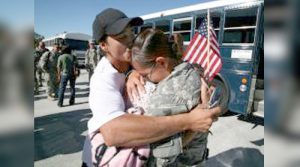Latino Soldiers Returning from Iraq
La Opinión

LAKEWOOD
, WASH. — “When you go to war … life stops, the whole time you’re away from home. But the people who are here still go on. They grow up, life goes on. It’s hard to go back and adapt,” Martha Arenas tells . Arenas was part of Operation Iraqi Freedom, which ended this week, with the departure of the last combat brigade from the country.
The images were seen around the world. In dusty regions of Iraq, soldiers from the Fourth Stryker Brigade Combat Team, Second Infantry Division, packed up their equipment and crossed into Kuwait, to complete the final part of their assignment and return home.
It’s been seven years and five months of fighting, and the work of Latinos in the armed forces has played an integral part at all levels.
Although the government doesn’t have figures on how many of Stryker’s 4,000 troops are Latinos, their importance to the work of the brigade is undeniable.
“Given the population of Hispanics in the armed forces, I think the probability of finding them in this brigade is high, as is their presence in any large-scale brigade or battalion,” says Catherine Caruso, joint spokesperson for Mc-Chord Air Force Base and Fort Lewis in Lakewood, where the brigade is based and where troops from Iraq are arriving.
According to Census figures, nearly 12 percent of army enlistees are Hispanic. This percentage is expected to double by 2020, if the current rate of recruitment continues. The army currently has 675,000 soldiers: 488,000 on active duty and 189,000 in reserve.
Yet no statistics can reflect the experience of Latinos in the war better than their own stories.
Martha Arenas was born in Los Angeles and raised in Mexico. In 2003, she enlisted in the army, where she studied communications.
On March 26, 2007, she was deployed to Iraq, where she was stationed for 15 months. There, her responsibility was to make sure that the soldiers had communications at all times and to keep watch in the towers. In addition, at night, she went out with infantry groups to conduct searches of Iraqi women. “The men from there use them to hide things,” she explains.
Five of the 11 members of her surveillance team were Hispanic. “As Latinos, we have very strong roots focused on the family, and when we don’t have (our families) by our side, we look for ways to replace the feeling of brotherhood and we come together.”
“We eat together, we get by speaking a little Spanish. Sometimes it’s not allowed, because other people can’t understand (what we’re saying). But they let us have that kind of contact, because they know we need it,” she says.
But for Arenas, perhaps the most difficult part of her time in Iraq is precisely what the last brigade of Operation Iraqi Freedom is now facing: coming home.
“A lot of people don’t understand how we feel,” she says. “The only refuge we have is another combat veteran. The only family we have is each other. There’s no way to explain what happened, what we are going through spiritually.”
“Latinos are very attached to God and there are certain things that happen over there that complicate life a little. To reconcile this, you have to look for support from other brothers in combat and from chaplains or priests. You feel isolated,” she confesses.
It’s an issue the army is aware of. It conducted a 15-month study, released in July, which found that suicides among soldiers had increased to 20 out of 100,000.
Last year there were 160 suicides among active-duty troops. The report found that 79 percent of those troops had been in a combat zone at least once. “We leave, saying we can do anything, and then the situation is different,” Arena says. “People are afraid to go to get the help they need.”
“To those who are returning I would recommend that they keep their head up, continue to move forward, be patient with people, because they don’t understand what we’ve just experienced, and don’t be afraid to get help,” she adds.
There are still more than 3,000 soldiers in the Stryker brigade in Iraq who will be returning to the United States in successive waves, ending September 10. This step will begin “Operation New Dawn,” in which the more than 50,000 troops who remain in Iraq will be training the local security forces.
Meanwhile, the troops who are returning home will have their own personal “new dawn” with their families, who are anxiously awaiting their arrival. They won’t be fighting an enemy here, but they will face a new battle: adjusting to life with their loved ones.
Translated by Elena Shore, New America Media






